Healthcare SEO puts your medical practice exactly where patients are looking — at the top of Google’s search results. A smart healthcare SEO strategy helps doctors and clinics showcase their expertise, make quality care easier to find online, and attract more patients.
Health-related content must be extremely accurate because it’s about human well-being. Privacy rules like HIPAA must be followed. Every page should contain appropriate medical disclaimers. And you’re often competing with major healthcare sites.
When you do it well, SEO transforms your online presence. Our healthcare SEO agency knows how to present your medical expertise in ways that both patients and search engines understand. And that’s what we’re going to share in this article.
- Doing medical SEO can be less costly in the long run than investing in paid ads day by day.
- SEO for the healthcare industry has stricter standards than regular SEO because it affects health choices and needs to be totally accurate.
- Google evaluates medical content using E-E-A-T principles: Experience, Expertise, Authoritativeness, and Trustworthiness.
- When searching for keywords, you should differentiate complex medical terms (used by professionals) from the everyday language patients understand.
- Mobile medical SEO is key since many health-related searches happen through phones today.
- Regular content updates are crucial as medical information changes frequently.
What Is Healthcare SEO?
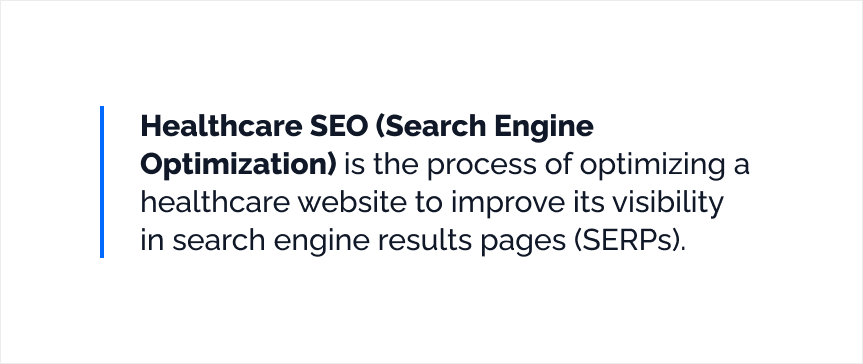
SEO stands for search engine optimization — It’s a range of strategies and techniques that help search engines understand and trust your website. Whenever search engine users type their request into Google, good SEO increases the likelihood that your site appears first on the list.
Healthcare SEO applies the same techniques but focuses on healthcare businesses.
To get your website seen by search engines and people, you need to consider the following best practices for healthcare:
- Keyword research: Finding exactly what your future patients type into Google and other search engines when they need healthcare services
- High-quality content: Sharing helpful medical information that answers real questions from patients and shows your expertise
- Technical medical SEO: Making your website fast, secure, and easy for Google to read and understand
- On-page SEO for healthcare: Fine-tuning each web page of your site to appear in relevant medical searches
- Site architecture: Creating clear paths so visitors can easily find the healthcare information they need
- Local SEO for healthcare: Getting your practice to show up when nearby patients search for medical care
- Reputation management: Taking care of your online image through patient feedback and reviews
- Link building: Getting other respected healthcare websites to recommend your site
- Performance monitoring: Checking what works and what doesn’t to keep improving your results
Yet, healthcare SEO requires more than just standard website optimization techniques. Health systems and providers spend about $39 billion yearly on regulatory compliance. Before you start the promotion of any medical services, you need to understand the potential repercussions of failing to comply with regulations.
Your marketing efforts and content should in no way compromise your compliance. That will greatly impact the way you approach your SEO. Whether you decide to do it yourself or outsource SEO, it’s important to understand the following:
- Trust matters more: Unlike regular websites, where trust definitely helps convert customers, medical websites need absolute trust because they influence health decisions. According to a survey of 1,700 American adults, 52% of Americans worry most about false or misleading health information. Your healthcare content must include verified medical facts, stay current, and be checked by experts because.
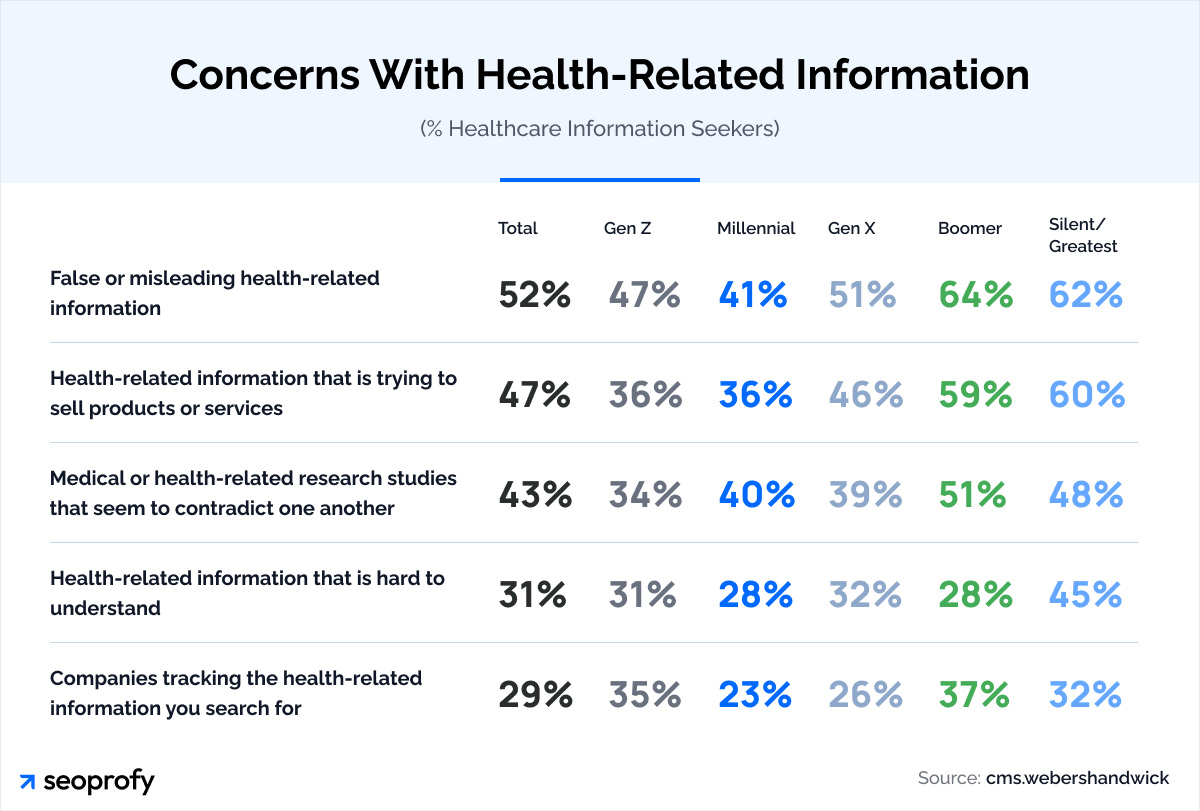
- Rules are stricter: While websites from non-regulated industries can just play by Google’s rules, medical sites have to follow HIPAA (Health Insurance Portability and Accountability Act) and FDA (Food and Drug Administration) standards. So, your medical SEO team should know what you can and can’t say not only to protect your reputation but also not to get hefty fines.
- Competition is tougher: Your rivals aren’t just similar businesses — you’re also competing with big names like WebMD and Mayo Clinic. These sites have huge budgets and a crew of experts creating and optimizing their content. They’ve spent years building up trust with both Google and target audiences.
- Local focus is critical: While some niches, like SaaS and ecommerce, can reach everyone across the globe if we speak about medical practices, they need patients who can visit them in person. Your SEO must target specific geographic areas and attract the right local patients.
- Medical keywords are different: Healthcare searches combine technical jargon with everyday language. Patients might search for “bad headache that won’t go away” while doctors use the term “chronic migraine.” Yet, it means the same thing.
- Content needs expert input: Regular content just needs good writers, but healthcare content wants medical professionals. Every article must be accurate yet be written in simple language so that patients can understand it.
- More challenging reputation management: In healthcare, patient privacy laws and medical ethics can restrict what reviews you can share. Patients may not feel comfortable exposing their health details. So, you have to think outside the box to build trust when you can’t always refer to your success stories.
Why Is Healthcare SEO Important?
While you may have a great website with valuable medical information and attractive design, that’s not enough to rank well these days. Other healthcare companies are likely already using medical SEO to appear at the top of search results. It can be hard for patients to discover you without the right healthcare search engine optimization.
Second, your target audience certainly spends time on the web, and the data proves it: 86% of Americans looked up health advice online and searched for health topics more than any other country in 2023.
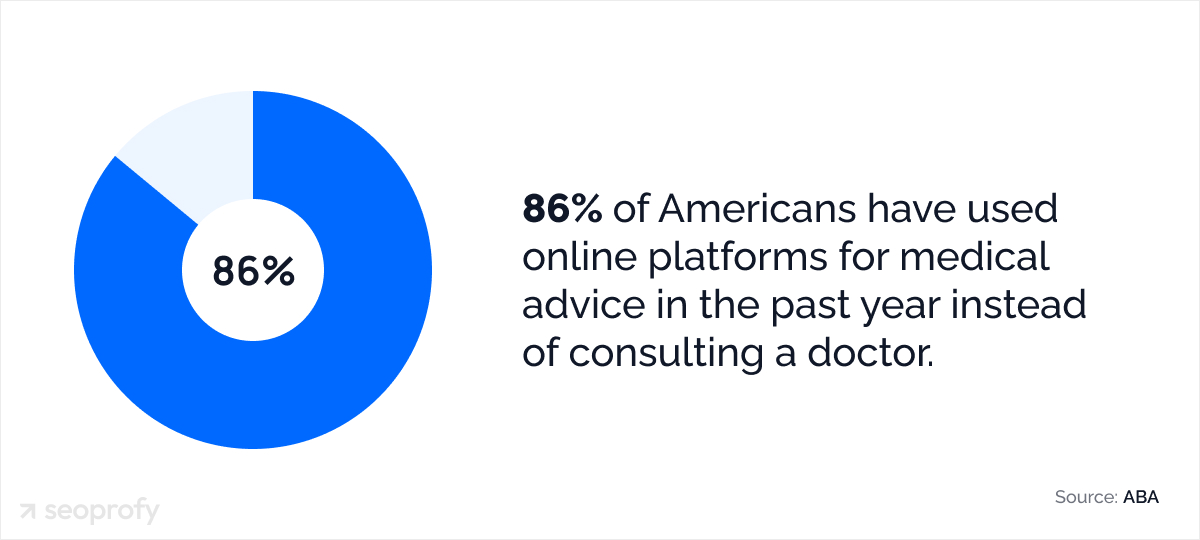
There’s even a new term for online symptom checking — cyberchondria, when people get caught in a cycle of searching for their symptoms online. And very likely, we’ve all done this at least once.
Here are some solid reasons why SEO is invaluable for you:
- Healthcare choices are huge decisions: Choosing a doctor or a treatment is way more serious than picking a pair of shoes. People take the time to research online before making these decisions. Good healthcare SEO makes it easier for them to find your reliable information during this research.
- SEO brings people who need you: SEO doesn’t just increase organic traffic to your website but makes sure this traffic is relevant to your healthcare business. It helps connect you with those actively searching for the exact medical products or services you offer.
- SEO is cost-effective long-term: Sure, it takes some initial time and resources, but the results stay and even compound for months or even years. Compare this with paid ads, where you get charged for every single click. Organic search traffic keeps coming in without additional costs once you reach top positions.
- Top rankings make patients trust you: People tend to trust businesses they see first on search results. And when they find someone who seems reliable, why should they check the second and third pages of search engine results?
- You can better understand patient concerns: Medical SEO shows you the health issues that lead people to seek medical help. It gives you insight into their specific concerns and questions, making it easier for you to address their needs better in the future.
How to Build an Effective Healthcare SEO Strategy
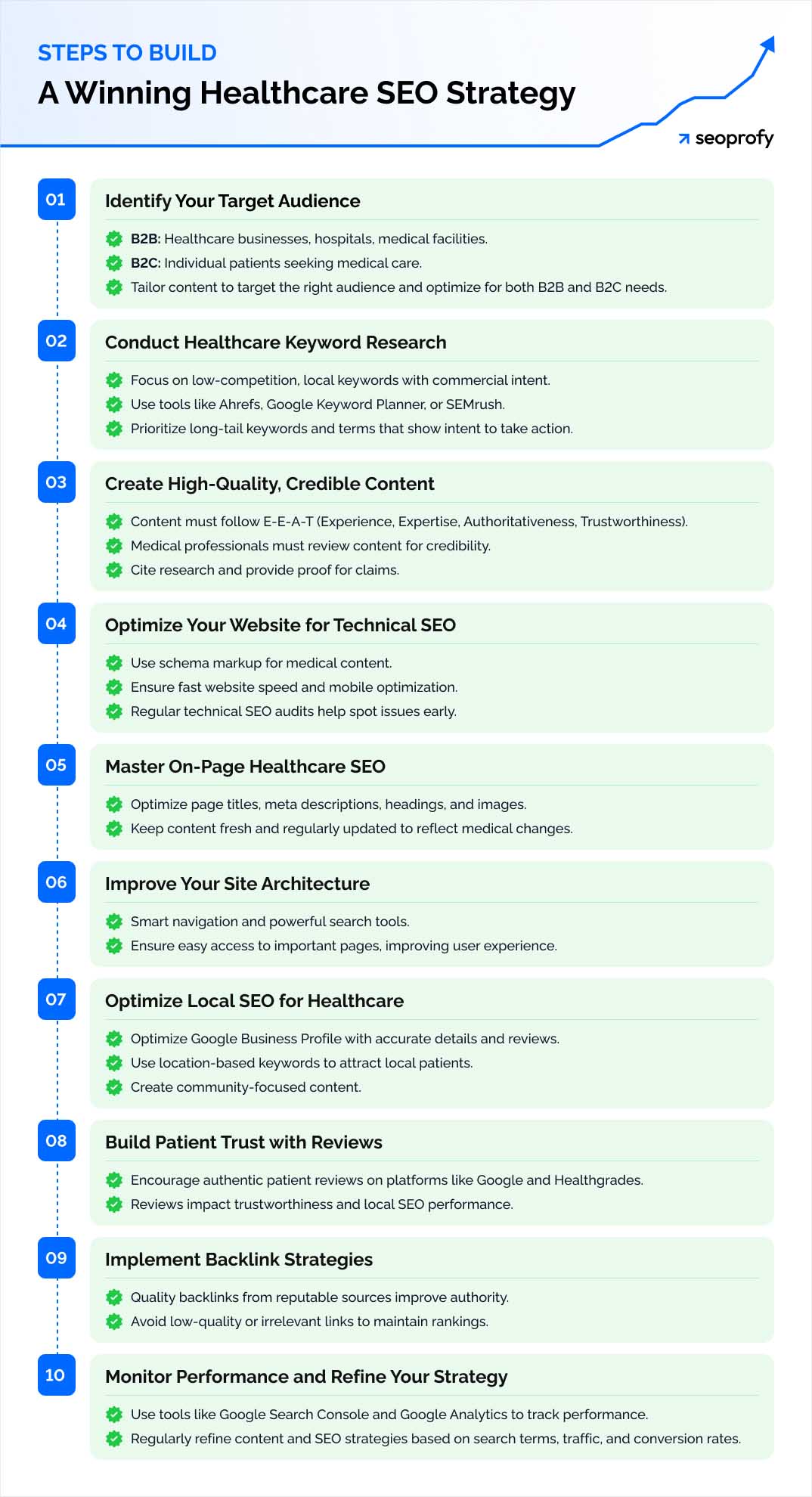
Not every medical SEO strategy is effective. Moreover, some techniques can even potentially harm your rankings. Some businesses may fall for “black hat” SEO tactics, like buying fake reviews, stuffing pages with keywords, or using bulk link building just for the sake of it, not considering third-party source credibility.
These might boost your positions for a few weeks, but if Google catches you, your search rankings will vanish overnight.
So, you need the right expertise and a clear plan to grow — that’s what our professional SEO company provides to our clients. Let’s look at exactly what makes a healthcare SEO strategy work. With a solid plan in place, you’ll build a steady stream of new patients without relying on expensive paid ads.
Let’s analyze how you’re doing online and determine how to improve healthcare SEO. Our search engine marketing team will conduct a detailed SEO audit revealing:
- Missing key terms in your field
- Your ranking vs. top rivals
- Tech issues affecting your rankings

Identify your target audience
Getting your healthcare SEO right starts with one big question: who needs your services? Everything you do depends on this answer. In healthcare, you might be targeting businesses (B2B), patients (B2C), or even both.
When it comes to B2B healthcare, you’re dealing with other businesses. For example, a medical software company looks for clients in hospitals. Your content has to resonate with them, focusing on ROI, the software implementation process, and long-term benefits. The sales cycle is longer since you’ll need a green light from different stakeholders, like IT and financial teams.
B2C healthcare calls for different solutions — you’re speaking directly to patients. Eight in ten Americans look for healthcare-related content at least once a year. And, as we said, they want clear, simple information about treatments, costs, and what to expect.
This makes your potential audience really vast, but you have to be able to target only certain demographics that are interested in your specific solutions. They’re often making decisions faster and need content that builds trust and makes them feel comfortable choosing your practice.
Success comes from focus, so start by identifying your main audience. This decision guides everything, from the keywords you use to how you structure your website.
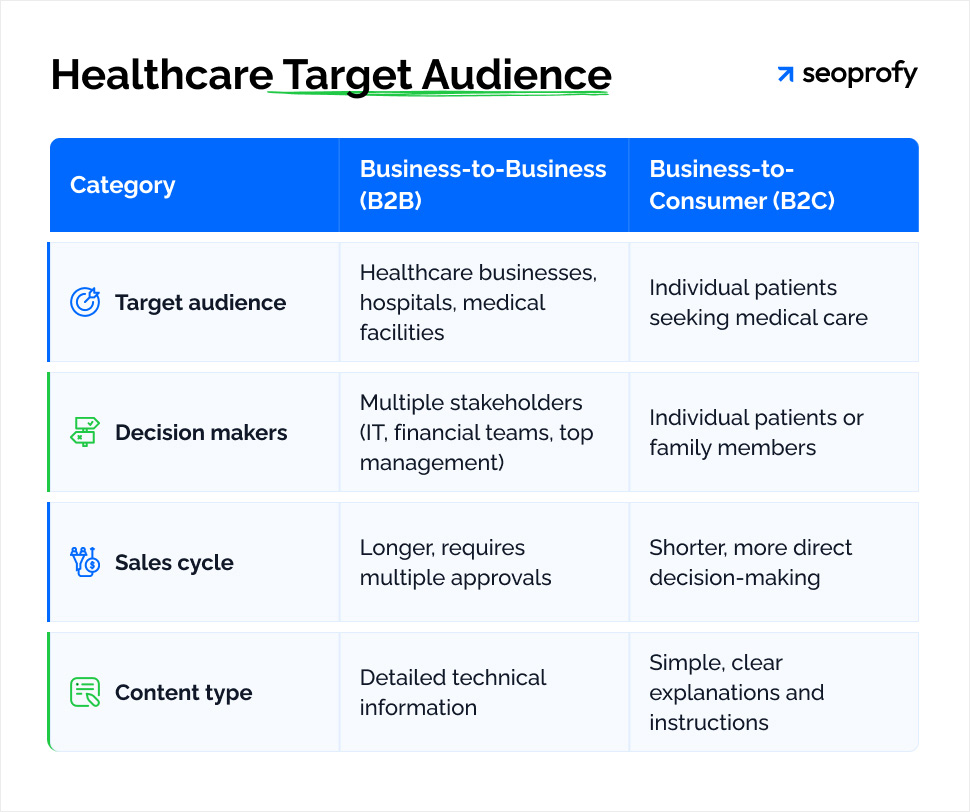
| Category | Business-to-Business (B2B) | Business-to-Consumer (B2C) |
| Target audience | Healthcare businesses, hospitals, medical facilities | Individual patients seeking medical care |
| Decision makers | Multiple stakeholders (IT, financial teams, top management) | Individual patients or family members |
| Sales cycle | Longer, requires multiple approvals | Shorter, more direct decision-making |
| Content type | Detailed technical information | Simple, clear explanations and instructions |
Conduct Healthcare Keyword Research
Keyword research tells you exactly what your future patients are typing into Google. Get this right, and you’ll be front and center when they’re looking for care. Get it wrong, and they’ll end up with your rivals.
To uncover the best keywords for your healthcare organization, take a look at these four key factors:
- Keyword competitiveness: As mentioned, medical terms often face fierce competition from major health websites and hospital chains. Consider where you can actually rank, like specific treatments, unique services, or local keywords. This matters since being third for a focused keyword is way better than being a hundredth for a popular one.
- Search intent: You should focus on keywords that align with your purpose — whether just to educate or to make a conversion. For example, someone searching for “what is arthritis” is looking for a different kind of information than someone searching for an “arthritis specialist accepting patients.”
- Local focus: Most medical searches have local intent. People need healthcare providers they can actually visit. Target keywords that specify both your services and your location. These usually have less competition and attract patients who can make an appointment with you.
- Business potential: Not all healthcare keywords hold the same weight. Some engage casual browsers, while others — patients ready to take action. Focus on keywords that show real intent to seek care, like “book appointment,” “accepting new patients,” or “treatment cost.”
Let’s say you want to find a long-tail keyword (longer, more specific search terms that usually convert better) for home health care. For this, you need Ahrefs, a specialized SEO platform that helps you discover exactly what people are searching for. You can also use Google Keyword Planner or SEMrush.
Start with keyword competitiveness. As shown in the screenshot, we’re looking for keywords where top-ranking sites have a domain rating (DR) under 50. This means smaller healthcare websites have a chance to rank since if a website with DR under 50 can rank in the top five for a keyword, you don’t need to be a healthcare giant to compete.
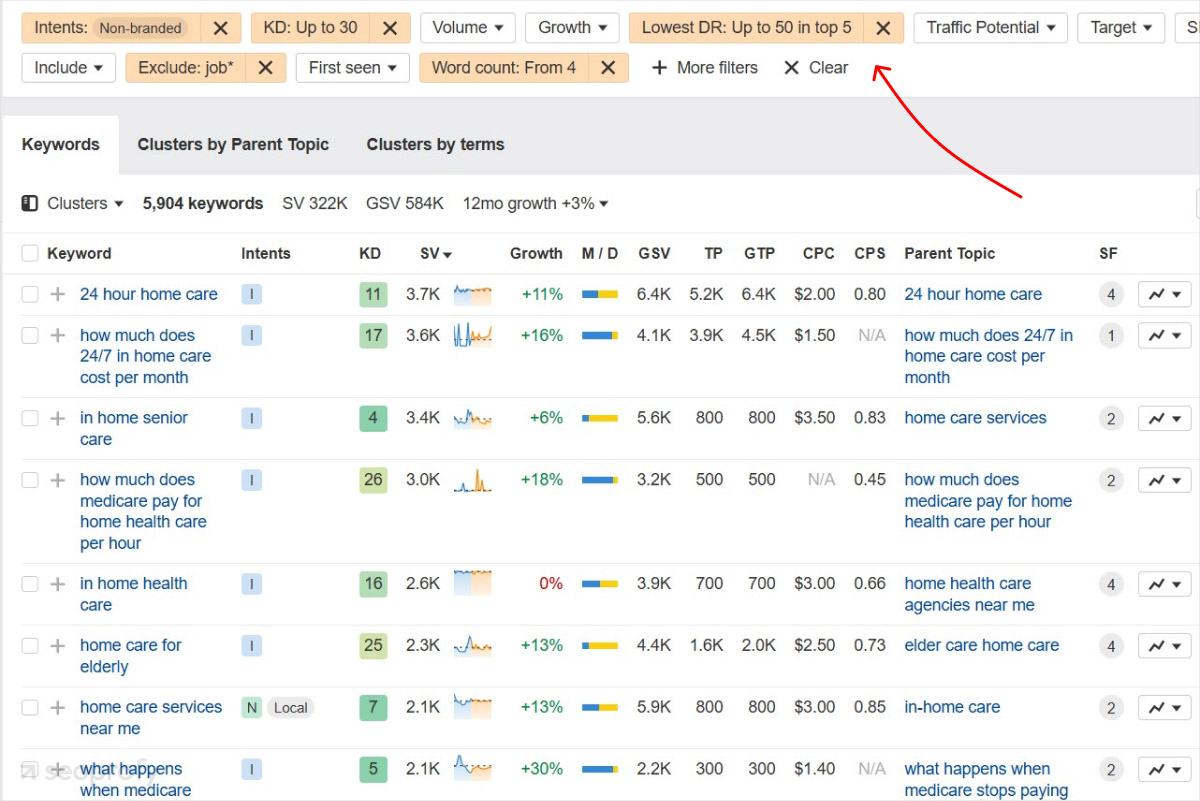
Here are several specific keywords that match our criteria for low competition and high search volume:
- “24 hour home care” has 3.7K monthly searches
- Its longer version, “how much does 24/7 in home care cost per month” has 3.6K searches
Next, pay attention to the search intent. As you can see, there are people who want specific pricing information, so there are those potentially willing to pay for this particular service. Most search intents fall under four key categories:
- Informational: Users want to learn about something, for example, explore available types of treatments for a certain condition.
- Navigational: With this intent, the search becomes a bit more specific. They may look for a certain website or a page.
- Commercial: At this stage, users are exploring options, comparing prices and looking for other details before purchasing.
- Transactional: Users are ready to take action, for example, book a consultation or buy a product.
You can also notice terms like “home care services near me” appearing in suggestions, which specifies people require this service locally.
Overall, during keyword research, review all the parameters for each keyword and pinpoint your best options. If you want to sell, you should choose terms with a commercial focus that enough people are searching for but aren’t impossible to compete against.
Create High-Quality, Credible Content
Medical content relates to the “Your Money or Your Life” (YMYL) classification and Google and other major search engines expect higher quality standards from YMYL web pages. That’s why everything you write has to be spot-on, reliable, and genuinely useful.
Your content strategy should focus on two key goals:
- Establish authority in your healthcare niche
- Drive conversions
When it comes to the right SEO content strategy, Google looks for signals of what they call E-E-A-T. And Google holds healthcare content at a higher bar than other industries. Let’s unpack what this means for your content strategy in healthcare.
Experience
This part determines whether your content comes from real-life experiences in healthcare. Google wants to see info from specialists who have actually worked in medicine and treated patients. Your first-hand experience can be reflected through practical insights, real examples, and simply deep understanding that only comes from hands-on work.
Expertise
Expertise shows how well you understand medical topics from a scientific angle. Google checks if your content reflects solid knowledge, keeps up with medical advancements, and explains difficult topics in simple words. It’s about showing that you have the right qualifications to raise these questions.
Authoritativeness
Authority is about how well-regarded your content is within the medical community. Google wants to see if other health sites link to your content, if recognized healthcare institutions acknowledge your expertise, and if your colleagues view you as a trustworthy source of medical information.
Trustworthiness
Google evaluates whether you back up statements with proof, keep your information fresh, and are honest about medical limitations and risks. It’s about showing your readers they can count on your material for accurate health knowledge.
This brings us to the point about generative AI. While AI can help draft content, healthcare information needs human medical expertise. Every piece should be reviewed and fine-tuned by qualified healthcare professionals who know both the science and its real-world use.
In the healthcare field, your content cannot simply be accurate — it must be reviewed by a qualified medical professional. Be open about the authorship and make sure to mention the medical professional reviewing your content, like in the example below.
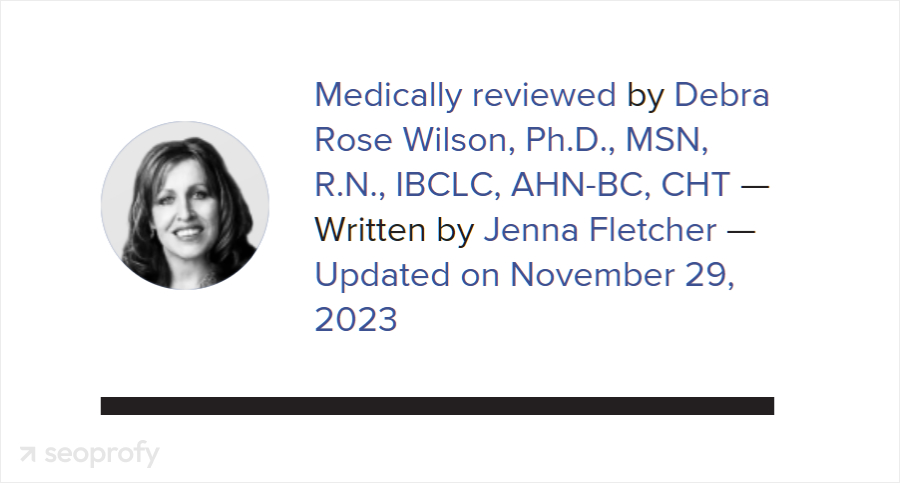
Equally important is backing up your claims with relevant and recent research. Use studies and research to show the origin of your claims. List the sources used to allow users to verify information.
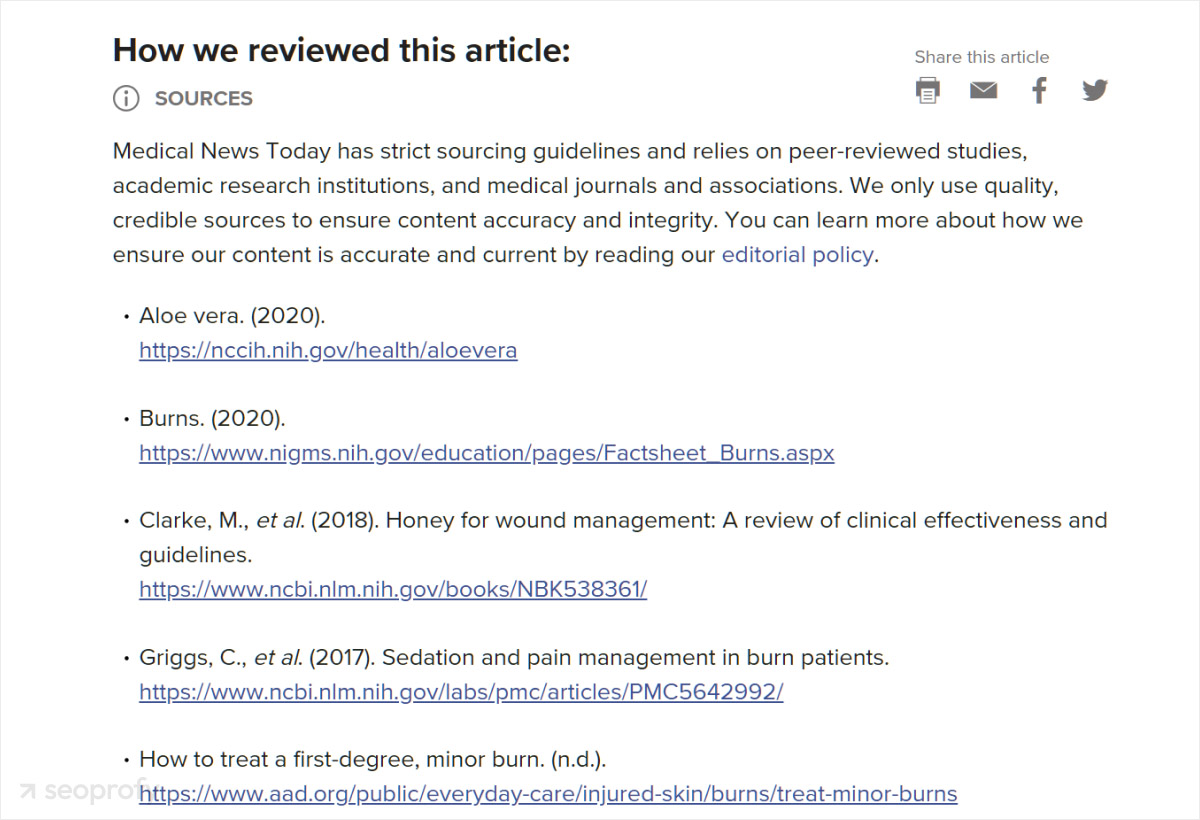
Optimize Your Website for Technical SEO
Technical SEO for healthcare providers is what sets the stage for your online visibility. Sure, great content makes clients stay longer, but technical search engine optimization makes sure they can actually find and navigate your site. Here are some of the things technical SEO covers:
- Schema markup: Schema markup is a special code you add to your website that tells Google exactly what your medical content means. When you use this kind of labeling, Google is more likely to show off your site in search engine results. You can create this markup easily using Google’s Structured Data Markup Helper.

- Website speed: A slow site can be annoying for visitors and harm your rankings. To make your website load quickly, you keep it speedy by optimizing your images, choosing fast hosting, and cleaning up unnecessary code. But if you don’t know the exact root cause of your slow website, you can determine it using tools like Google PageSpeed Insights, Google Search Console, and GTmetrix.
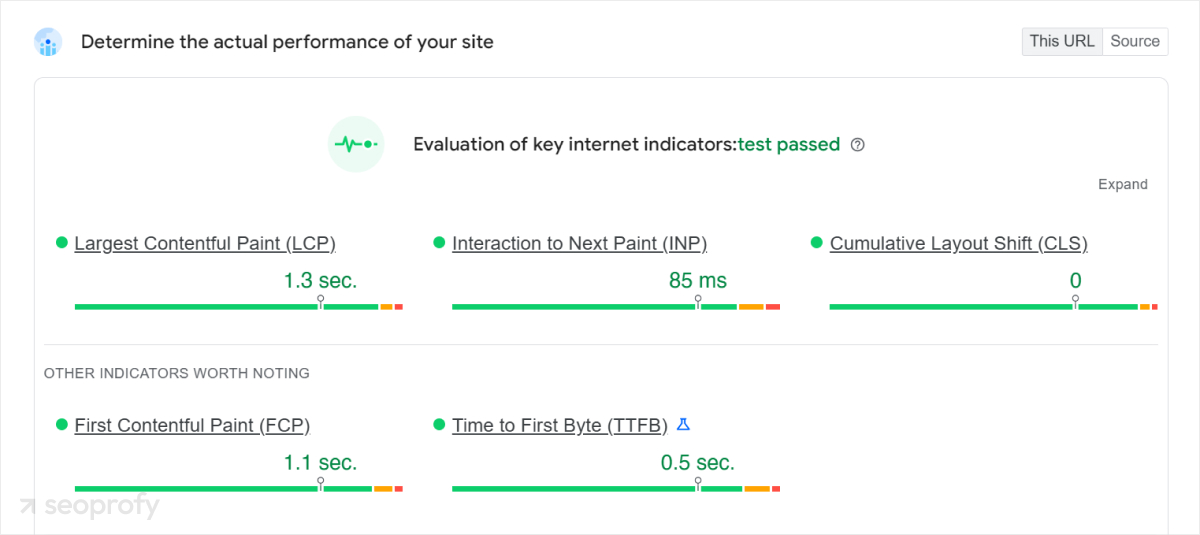
- Mobile: Many health searches happen on phones, especially when people are in a hurry. Your site has to work flawlessly on all devices. Make sure medical forms are easy to fill out, phone numbers are clickable, and text is easy to read without zooming in.
Regular technical SEO audit helps spot and fix issues before they affect your rankings and user experience.
Master On-Page Healthcare SEO
Once you’ve handled the technical foundation, it’s time to optimize each page of your healthcare website. This means fine-tuning every element to help both visitors and search engines understand your content:
- Page titles: They’re often the first thing people see in organic search results. Each page needs a unique title that includes relevant medical terms.

- Meta descriptions: These are short summaries that appear in search results, and they should clearly tell patients what they’ll find on your page. Include key medical terms and a clear call to action, like “Learn about our advanced cardiac treatments” or “Schedule your consultation today.”

- Page headings: They guide website visitors through your content. Consider breaking information into clear sections using medical terms your audience searches for. But keep it natural and don’t stuff keywords where they don’t belong.
- Images: Give them descriptive file names and alt text that explain what they show. For example, alt=”Medical professional checking patient’s blood pressure in a modern clinic setting.”
- Formatting: Use proper formatting to make medical content easy to digest. We recommend breaking up long explanations with bullet points (just like we do in this article), highlighting warnings or instructions, and keeping paragraphs short.
Last but not least, keep your content fresh. Since medical data can change, it’s wise to regularly review and update your pages. You may also show the last update date to build trust with your visitors.
Improve Your Site Architecture
While on-page SEO for hospitals is about optimizing each particular page, site architecture refers to the way your entire healthcare website is organized and connected. Here are key aspects of site architecture to pay attention to:
- Smart navigation: First of all, create a clean, logically organized main menu. You can put related medical services in separate groups. Every important page should be just a few clicks away so that patients have quick access to what they need. Take a look at how MayoClinic did this: they created separate sections for different target audiences: for potential patients and medical professionals.
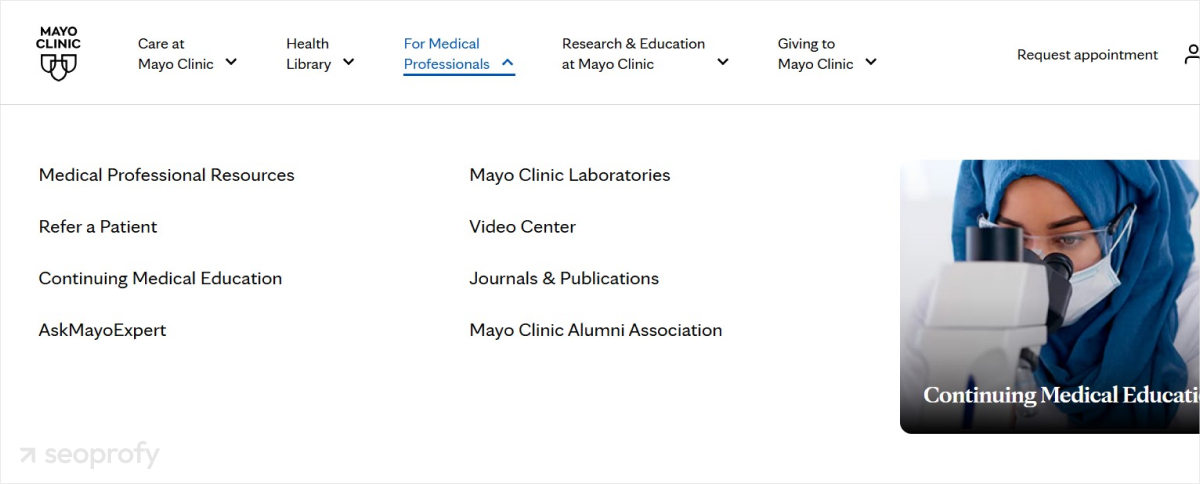
- Powerful search tools: Install a search feature that understands medical terms even when they’re misspelled.
- Internal linking: Be sure all your medical content links together in a way that helps patients get the full picture. If they’re reading about symptoms, link these pages to related diagnostic services.
- Future-ready structure: Design your website architecture with growth in mind. Whenever new services and educational content appear, they should fit naturally into your existing structure.
Bring More Patients to Your Door with Local SEO
Most healthcare keywords have local search intent. When someone’s tooth hurts at midnight or they need a specialist near their office, local healthcare SEO helps your practice appear in these crucial moments, and here are some SEO tips to master it:
- Google Business Profile: When people see a company with a Google Business Profile filled with relevant address and phone number, pictures, and positive online reviews, they’re 2.7 times more likely to think of it as trustworthy. Create and optimize your Google Business Profile: add relevant contact details, post fresh photos of your clinic, and reply to patient reviews. Once you do this, here’s how your profile will be displayed in search results:
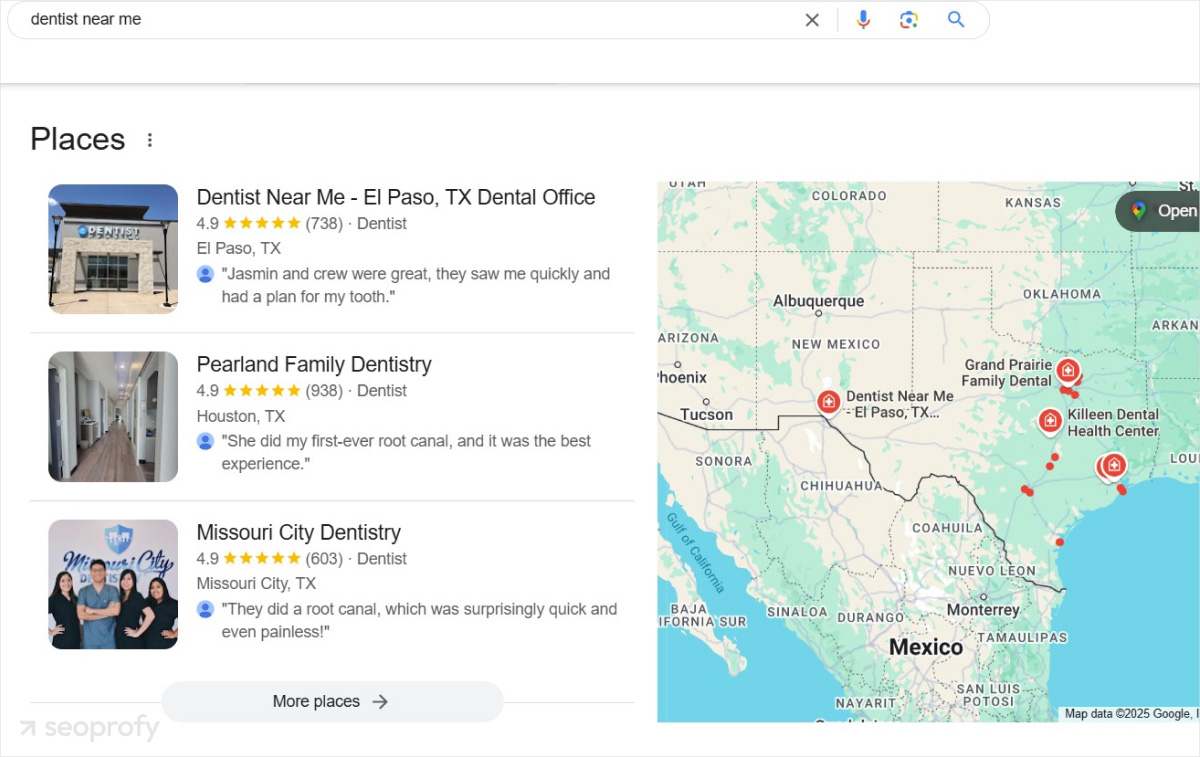
- Location-based keywords: If you’re a heart specialist in Boston’s downtown area, specify this on your medical website. If your business serves different locations, you can create multiple pages for the same service, which include keywords for this specific location.
- Community-focused content marketing: You can also write about health issues that matter to your local patients. For instance, if spring allergies are common in your city, you can add some articles about it to your blog.
Build Patient Trust Through Online Reviews
Online reviews have become essential for medical practices. Today’s patients read an average of 7–10 reviews before choosing a healthcare provider. Each authentic patient story builds trust and impacts your medical SEO performance in local searches.
Great reviews start with exceptional care. Little things can make a huge difference — like short waiting times, a friendly team, and clear info about treatments. When patients feel cared for, they’re way more likely to share their good experiences. So, it’s best to ask for reviews right after a successful treatment or follow-up.
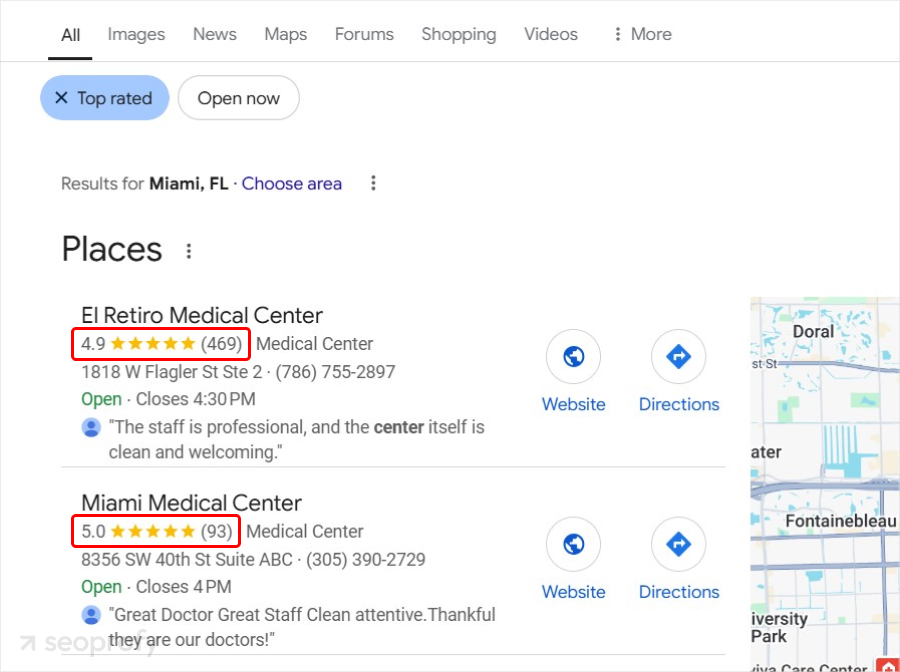
Your medical practice should have reviews on various sites because patients look in different places based on their needs.
When nearby patients search for a doctor on Google, they see the Google reviews first. But some patients do deeper research. They might check out Healthgrades.com. Here, patients often leave in-depth reviews regarding specific treatments or conditions they have.
Implement Powerful Backlink Strategies
When reputable medical websites link to you, search engines start viewing your practice as more reliable. The best backlinks come from respected hospitals, medical journals, and local health groups.
But remember, in link building, quality beats quantity. Just one link from a big medical institution can be way more valuable than lots from random sites.
You can score good links in various ways. Sometimes, websites will link to you naturally because they recognize your expertise. Other times, you may need to reach out to other sites and write a guest post they will be willing to publish, and this most often costs money.
And avoid links from sketchy sites, as they can hurt your reputation and medical SEO rankings. If you order links from low-tier sites, ones with ads, or those that have nothing to do with your field, these can actually lower your rankings. The same thing happens with links from sites in languages you don’t speak or from countries you don’t serve.
For example, the image below shows a SERP analysis of the keyword “dental insurance.” Sites with higher DR and quality links from authoritative domains, such as medical or government websites, outperform others regardless of sheer backlink volume.
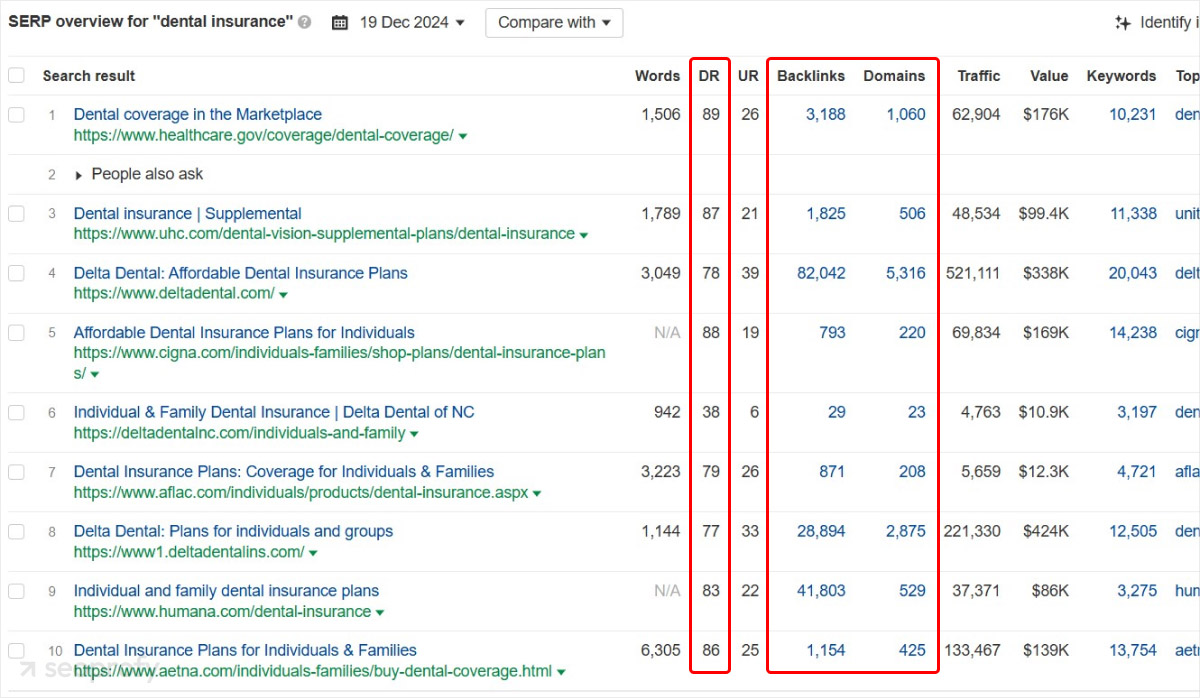
Monitor Performance and Refine Your Approach
After you’ve implemented all the above healthcare SEO strategies, there’s still one important step: figuring out if they’re actually doing anything for you. SEO performance monitoring will help you see if your hospital SEO efforts are paying off or if you should change your approach.
Where to start? Look at your rankings for key search terms and determine which pages attract the most visitors and how long they spend time there. Most importantly, see how many visitors are taking real action on your site.
Google Search Console will assist you in this process. It reveals which search terms are driving website traffic. You might find some fresh opportunities you didn’t consider before. It also lets you know if there are any common SEO issues that need your attention.
For example, if visitors tend to leave certain pages quickly, those pages might need more engaging content. And if mobile visitors aren’t converting, your site could require better mobile search engine optimization for healthcare.
Bottom Line
Healthcare SEO is different from a lot of other fields because it’s about people’s health. That’s why it should be approached carefully. With the right medical SEO, every little boost will mean one more person can find your website and book an appointment with you.
Ready to make your medical expertise easier to find for those who need it? SeoProfy is here for you! Our team has expertise in SEO for medical practices and offers various SEO services: crafting credible medical content, optimizing it with relevant keywords, building your online reputation, and much more.
We follow all the latest healthcare SEO trends, updates of search engine algorithms, and medical SEO marketing requirements, so you don’t have to worry about either. Let’s start with a conversation about your goals!













